“Aladdin and the Marvelous Lamp” makes its first appearance in the West in Antoine Galland’s 1710 edition of Les Mille et Une Nuits (One Thousand and One Nights). The story has been modified and readapted in many languages since then. But it was not included in Edward Lane’s The Arabian Nights’ Entertainments (1838–1840) for the simple fact that it has no Arabic or Persian precedent. Richard Burton’s The Book of the Thousand Nights and a Night (1885–1888) includes what is essentially a translation and expansion of the French original.
A Maronite storyteller from Aleppo by the name of Hanna Diab was said to have relayed the story to Galland while he was residing in Damascus. Despite the Arab names and Muslim themes that run like a thread through this ostensibly Middle Eastern folk tale, the story is set almost entirely in China. My adaptation situates it in a fictitious sultanate on the western rim of the Tarim Basin at a time when that region fell under the sway of a Mongol dynasty that had adopted Islam but had Buddhist priests and Tengrist shamans in its court.
I have tried to remain faithful to the sequence of events as they appear in the French version, but have abbreviated repetitive passages, embellished many others, and omitted the ridiculously offensive parts. I have included details concerning medieval Central Asian history based on a lifelong interest in the topic, and an opportunity I had in the early ’90 to attend courses and lectures out of Indiana University’s Department of Uralic and Altaic Languages that were taught by professors and adjuncts, many of whom were former Soviet citizens whose personal stories rivaled anything found in the Arabian Nights.
Aladdin and the Marvelous Lamp: Part 1
Part 1 | Part 2 | Part 3 | Part 4
Once upon a time, a city of the Chagatai Khanate stood perched atop a ridge overlooking the wind-swept sands of the Taklamakan Desert. The city was a halt for merchants and pilgrims traversing the ancient roads that crisscrossed the grassy steppes and rugged plateaus that lay between the eastern and westernmost limits of the known world.
The ruler of the city was a benevolent but rather dissolute sultan, who traced his lineage to Temüjin the Great, but had not inherited the Conqueror’s bellicosity or competency in the saddle. The city abutted territories subject to the Son of Heaven, but was far removed from the lands of the Abbasid Caliph in Baghdad.
In the clothiers’ quarter (behind the reeking tanneries) there lived a poor tailor named Mustafa, who earned barely enough to provide for his wife and only child, a boy whom the venerable imam of the mosque had proposed naming Aladdin, since the phrase in Arabic meant “Nobility of Faith.” Mustafa thought this was a wonderful name. So he kissed his son’s brow and said, “I am your father, Aladdin.”
The tailor was already old when Aladdin was born and had no time to raise his son properly. So the child grew up without direction and acquired many bad habits. He was stubborn, willful, and disrespectful toward his mother. And as soon as he was old enough to escape her supervision, he started sneaking outside each morning to play with the vagabonds in the street. He became their leader and bullied the younger boys into stealing things on his behalf.
When Aladdin was of the age to learn a trade, Mustafa brought him into the workshop to teach him how to be a tailor. But the child was uninterested in learning a profession he derided as beneath his dignity. He would yawn and pull silly faces to mock his father when he tried to teach him how to handle a needle and thread. Mustafa scolded Aladdin, which only emboldened the lad. And when his father became ill, the so-called “Nobility of Faith” did not seem to care.
One morning, Mustafa confided to his wife that he had had a dream in which the wind horse that had brought him down from Heaven on the day he was born could not fly back up, because an unbreakable silken thread tethered it to the Earth. When he awoke, he felt a sensation of needles pricking his bones. That afternoon he was found sitting in his workshop with a bone needle in one hand and a silken thread in the other, the tip of which he had managed to insert into the needle’s eye the instant he died.
When his widow realized that Aladdin would never follow in her husband’s footsteps, she sold the shop and all it contained. She prayed to Allah that the proceeds from the sale, in addition to the meager earnings she made by carding wool, would be sufficient to keep her and her wayward son alive.
Now that his father was dead, Aladdin became even more unruly. And when his mother reprimanded him, he threatened to leave the house altogether if she did not stop pestering him. Exasperated, the poor woman withdrew into a state of miserable solitude and despondency, finding solace only in the Glorious Qur’an, the surahs of which she recited from sunup to sundown.
Aladdin celebrated his fifteenth birthday by creating a disturbance in the marketplace. He kicked away the props holding up the attar merchant’s awning in order to distract the crowd while he filched a handful of sea buckthorn from another vendor’s cart. Unburdened by the fruit, which he stuffed quickly into his tunic, the boy scaled a rickety ladder and disappeared over the rooftops before anyone could catch him.
A sorcerer from Tibet had been watching these proceedings from beneath the flaring eaves of a noisy teahouse. At last, he thought, I have found a boy who is small and nimble enough to fulfill my dark purpose.
The sorcerer inquired into Aladdin’s history, and when he was certain that he had learned enough, he removed a bamboo slip from his robe. The scroll was covered in magical symbols that would enable him to locate the boy. He projected his spirit over the city and found Aladdin eating the berries that he had stolen in another quarter of the city.
The sorcerer went there, and confronted Aladdin in the street. “Are you the child of Mustafa, the tailor?”
“Yes,” Aladdin replied, looking this way and that in case he needed to flee. “But my father died long ago.”
Tears welled in the sorcerer’s eyes, and he flung his arms around the boy’s neck.
“Why are you weeping?” Aladdin asked, disengaging himself from the stranger’s embrace.
“How could I not weep? My dearest brother is dead. But I have found his son.”
“What?”
“For many years I roamed the Earth in pursuit of wealth and power. But I have learned that these things are mere vanities of the mind. The only thing that matters is . . . family.” His broad smile disclosed sharp teeth. “I see in you the brother I have lost.” Gently, he placed his hand beneath Aladdin’s chin. “Is your mother still alive?”
“Yes.”
The sorcerer reached into his purse and removed two copper coins. “Give these to her; and tell her that I would very much like to call on her, so that I can learn how my brother lived, and how he died.”
Aladdin ran back to the squalid hovel where he and his mother lived. They were so poor that, in lieu of a door, the entrance was covered by a carpet nailed to the lintel. The boy flung this aside and startled his mother, who was cleaning out the hearth ashes.
“Mother! Do I have an uncle?”
“No,” the pious woman said. “Neither on your father’s side nor mine.”
Aladdin related to her all that had transpired between him and the stranger. When he handed over the two copper coins, the widow gasped.
“Mother, are you sure father had no brother?”
She paced the room, and spoke to him over her shoulder. “He did have a brother. But he was said to have died long ago in Tibet.”
They spoke no more of the matter. But Aladdin’s mother placed the copper coins side by side on the rug and stared at them for a long time. She whispered that she would not be opposed to meeting the stranger, so long as his intentions were honorable.
The following morning, Aladdin found the sorcerer in the same place where they had met the previous day. He told him what his mother had said.
“Since she is amenable to the visit, I shall come this evening after the isha prayer has concluded.” Casually, he dropped two Venetian ducats in Aladdin’s hand. “Perhaps she can use this money to prepare a meal for us. Incidentally, I do not know where you live.”
This was a lie. The sorcerer knew exactly where the boy lived. But he did not want to come across as being overly familiar with Aladdin’s history and circumstances.
Aladdin could not tear his eyes from the golden coins in his palm. But in a faint voice he gave the stranger directions to his house.
When the boy’s mother saw the ducats, she nearly fainted. “I need pulverized flour! I need to reserve the communal oven to bake bread! Tonight, you shall dine on meat, my son!”
Aladdin was taking a nap when she returned from the market. A train of porters bearing baskets had followed her home. Aladdin’s mother kicked her son in the ribs and told him to go ask the neighbors for dishes, since they had none in the house.
When the cushions had been fluffed and the dishes laid out on the sufra (or floor table), Aladdin’s mother began lighting the tallow candles and arranging the furniture in an effort to make the hovel look respectable. When they had concluded the evening prayer, she asked Aladdin if he was sure the stranger knew how to find the house.
“I gave him directions. But I’ll stand outside and wait for him.”
He flung the carpet aside. The sorcerer was at the threshold. Aladdin looked up into the man’s face. He thought he saw two irises in each eye, which merged into one. But he dismissed this as a trick of the firelight, and welcomed the stranger into the house.
When the sorcerer stepped in, the candles dimmed and the insects retreated into the cracks in the walls.
Aladdin’s mother wore a veil and refused to eat. She remained kneeling throughout the meal, hands folded on her lap, as her son and the stranger glutted themselves on lamb khorkhog, honied boortsog, and other delicacies.
The sorcerer regaled them with exotic tales of his travels. In Ceylon, he had witnessed a flock of rukhs carry off in their talons the sacred cattle of Bala Gopala. In the valley of Kashmir, he had listened to a Sufi play a tune on his sitar so bewitching that its vibrations had for many years reversed the course of the Jhelum River.
“But now that my brother is dead,” he remarked, covering his eyes, “these marvels seem to me as insubstantial as the wavering mirages that haunt the wastes of Araby the Blessed. But it is a consolation to have found my brother’s son . . .” He glared at Aladdin between parted fingers. “How embarrassing: I don’t even know the boy’s name.”
“Aladdin,” his mother said. “My son’s name is Aladdin.”
“And what is your trade, Aladdin?”
“He has none,” the poor woman wept. “He is lazy and causes me much grief.”
Aladdin scratched his cheek and shrugged.
“This is unacceptable, nephew. You must have a trade so that you can take care of your mother. If being a tailor does not appeal to you, what about the life of a merchant? I will set you up in a shop where you can sell expensive clothes and fabrics.”
Aladdin thought about this. It seemed a good idea. He hated manual labor. But if he had a shop full of ready-made clothes, he could pick rich foreigners’ pockets as he pretended to take their measurements. “You would do this for me, uncle?” he asked.
“Why would I make a promise that I did not intend follow up on it? Tomorrow you and I will go to the khan. There, I will buy you new clothes. You need to look the part if you are going to sell such costly things.”
Aladdin’s mother clapped her hands together and thanked the stranger, confessing that she had at first been skeptical of his motivations and thought it improbable that he was Mustafa’s brother. But his kindness toward her son had shown him to be a blood relation, and a kind man.
The next day, the sorcerer conducted Aladdin to the khan. When the boy saw himself decked out in embroidered clothes and a beautiful headscarf, he could not believe how lucky he was to have found this doting old man whose purse seemed as inexhaustible as his generosity.
“You will have a shop like this soon, my nephew,” the sorcerer said, gesturing to the bolts of silk and muslin. “I want you to experience what it is like to be looked upon with respect and esteem.”
The sorcerer led Aladdin to the grand mosque, where the girls round the ablution fountain, hurried away, blushing and concealing their faces behind their veils. None of the men at the mosque recognized the low-born boy whom they had prayed with for years.
Aladdin and his uncle then descended the broad steps leading to the serene Buddhas carved into the faces of the rock. The monks in their saffron robes, who were reciting mantras, could not help but to steal curious glances at the resplendent youth so richly accoutered, whose graceful mien marked him as one abounding in karuna, which is to say “compassion.”
As the shadows lengthened, Aladdin and the sorcerer wandered back up into the city. They followed a line of Bactrian camels, as it passed under the marble archway and into the lamplit interior of the covered caravanserai. Here, travelers from the four corners of the Earth came to lodge, barter, and indulge themselves in carnal pleasures.
There were fakirs from al-Hind, Christian holy men from al-Sham, and merchants from as far away as Zanzibar and al-Maghreb. Aladdin’s uncle spoke familiarly with many of these men, who called him by a name that the boy had difficulty pronouncing. “Uncle, why do they call you Al . . . Al-Grip?”
“Al-Gharib is an Arabic word meaning ‘the stranger,’” the sorcerer said, averting his eyes from the boy, as he tired to recall all he had learned the previous day about Aladdin and his father. “I am called al-Gharib because I do not have a name. I was kidnapped long ago in Tibet, when Mustafa and I were younger than you. The man who abducted me was an evil sorcerer, who said that he had murdered the boy I was; and that if I ever repeated the name I was given at birth, I would perish a second time.”
The sorcerer wondered if the boy had this lie convincing. But Aladdin was mulling the way the merchants had treated al-Gharib. Maybe he’s not as famous as I thought he was, and they were simply calling him ‘stranger’ to be polite.
That night, when Aladdin and his uncle to the house, his mother was beside herself. “I almost mistook you for a prince, you are so handsome! And now that you are dressed like a nobleman you are behaving like one.”
Aladdin smiled and wiped his runny nose on his sleeve.
“My nephew is shrewd and capable,” the sorcerer observed. “He only lacks direction.”
“Thank you, uncle,” the boy said. He had to admit that he was feeling different. And hearing his mother praise him made him recall with shame all the terrible things he had said and done to her.
“I had hoped to set Aladdin up in his shop tomorrow,” the sorcerer remarked. “But it will be Friday and the khan will be closed. But I have an idea. I shall return in the morning and take your son to the base of the mountain, so that I can show him the gardens and pleasure palaces that the wealthy and puissant have built for themselves in the oasis bordering the desert.”
“What for?” Aladdin’s mother asked, furrowing her brow and glancing at her son.
“Because I want him to see for himself the kind of life that awaits him, so long as he does everything that I tell him to do.”
Aladdin ran to the sorcerer, fell to his knees, and fervently kissed the carnelian ring on the man’s withered right hand. He wondered how he had not noticed the ring before. It was carved to resemble the face of a demon. The carbuncles eyes, now luminous, seemed each to contain two irises that merged into one as Aladdin stared into them. He felt his knees buckle. He fell backward and landed on his rump. But he could not turn away from the glowing stones.
“Aladdin!” his mother said.
He wheeled around.
“Help me clean up! Your uncle left an hour ago. You’ve been sitting there like an idiot ever since.”
When Aladdin turned again, his uncle was gone. The carpet door flapped in the breeze. And the boy went to it, so he could secure the leather thongs at its edges to the pegs in the wall.
When Aladdin and his mother had put away the leftover food and cleaned the neighbors’ dishes, they performed the tahajjud prayer, and prepared for bed.
Aladdin removed his new clothes, donned his filthy tunic, curled up on the mat by the fire, and fell asleep. That night he dreamed that his father ascended into Heaven on the back of a shimmering wind horse, as a silken thread fell from the sky and landed in Aladdin’s hand.






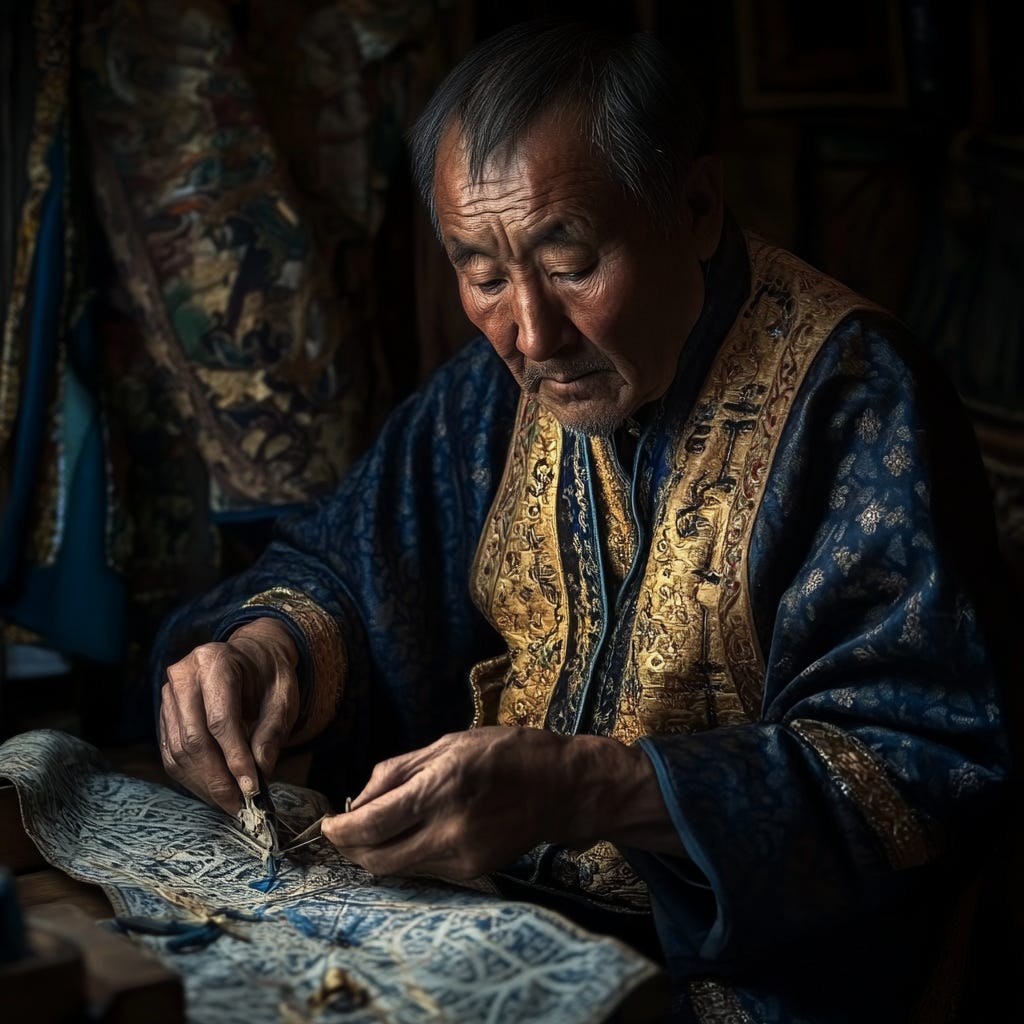
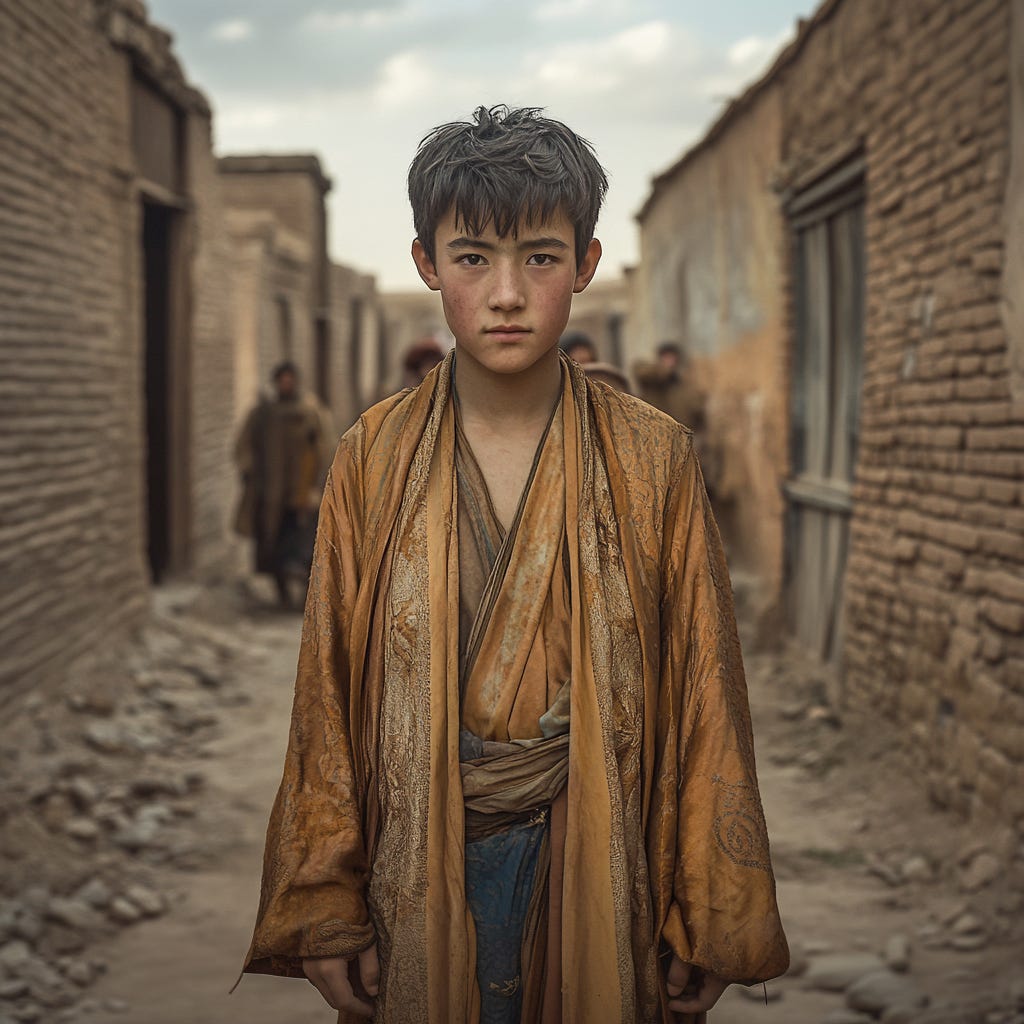
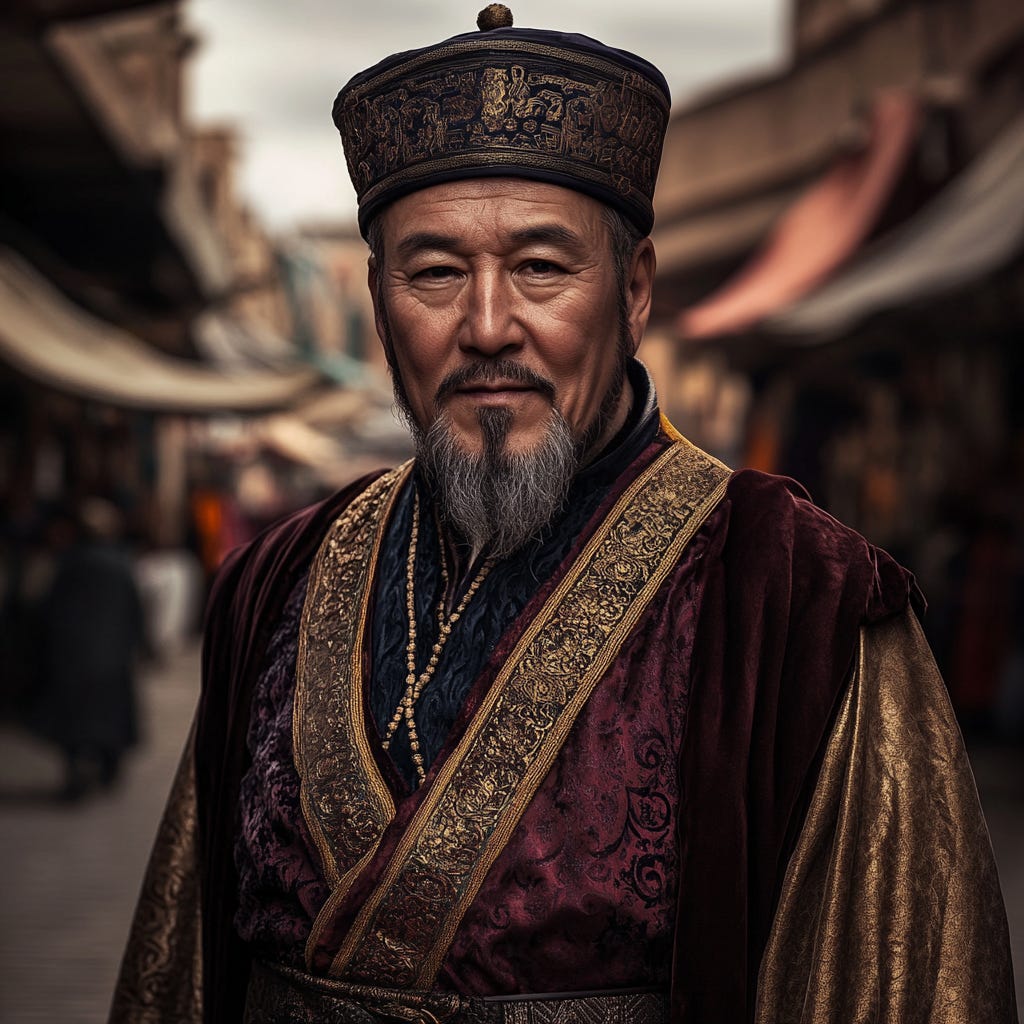
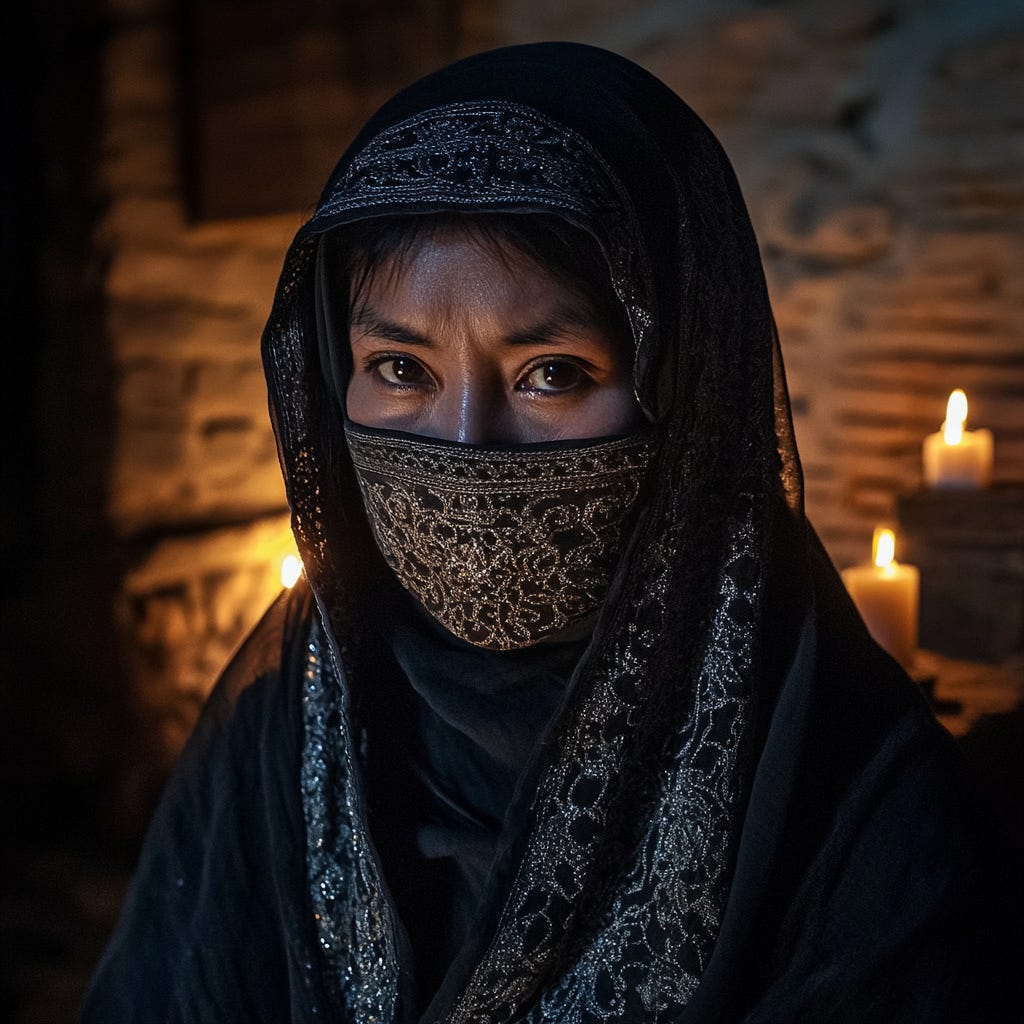


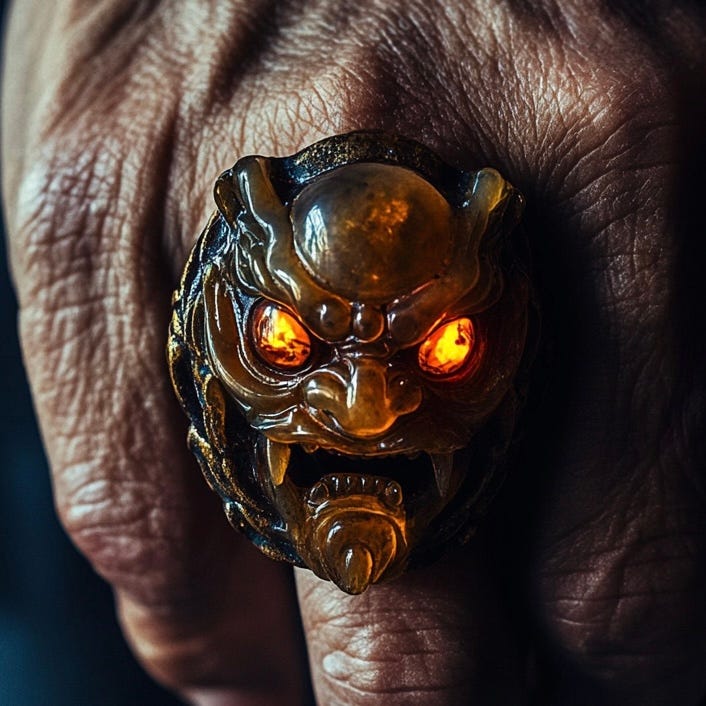
Very interesting facts at the beginning. I learn a lot from reading your stories lol
Ooh, this already has me hooked! I admit I've never read the original, though I'm familiar with the basic characters and plot. But I really like this change of setting, which has such a rich history of its own and brings a new dimension to the story. Already off to an impressive start, and I'm looking forward to the rest!